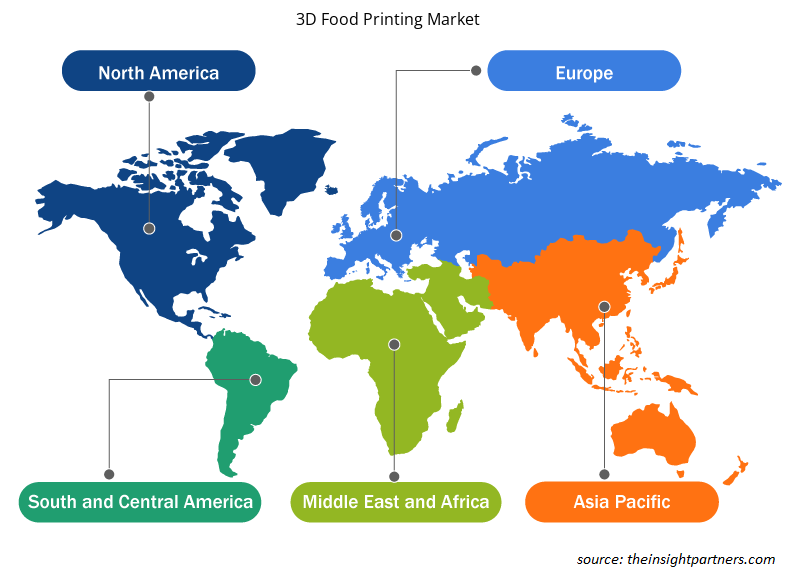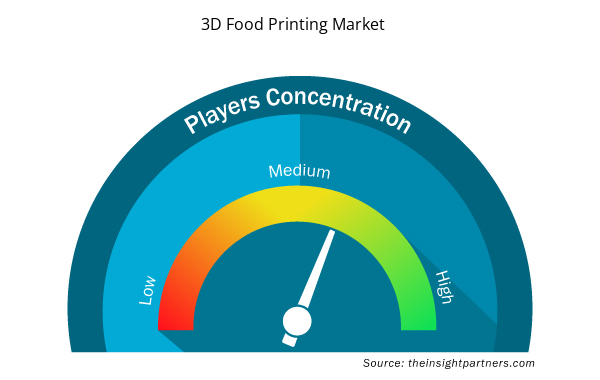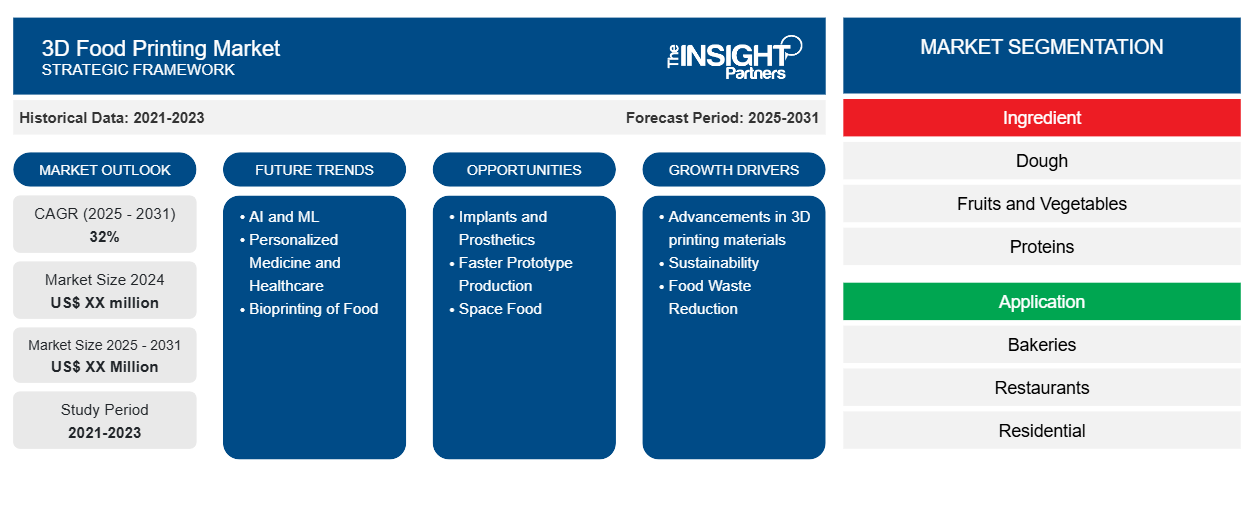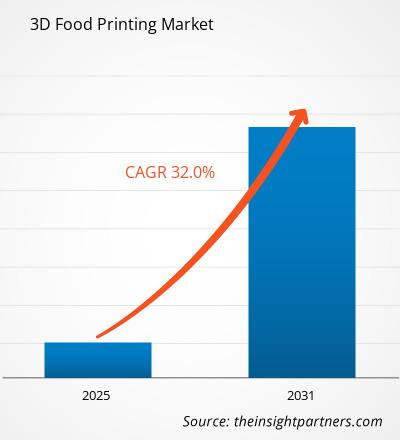3D 식품 인쇄 시장은 2023년부터 2031년까지 32%의 CAGR을 기록할 것으로 예상되며, 시장 규모는 2023년의 XX백만 달러에서 2031년 XX백만 달러로 확대될 것으로 예상됩니다.
보고서는 재료(반죽, 과일 및 채소, 단백질, 소스, 유제품, 탄수화물), 응용 분야(베이커리, 레스토랑, 주거) 및 기술(용융 증착 모델링, 열풍 소결, 바인더 제팅, 오픈 소스)을 기준으로 세분화됩니다. 글로벌 분석은 지역 수준과 주요 국가로 더 세분화됩니다.
보고서의 목적
The Insight Partners의 3D 식품 인쇄 시장 보고서는 현재 상황과 미래 성장, 주요 추진 요인, 과제 및 기회를 설명하는 것을 목표로 합니다. 이를 통해 다음과 같은 다양한 비즈니스 이해 관계자에게 통찰력을 제공합니다.
- 기술 제공업체/제조업체: 변화하는 시장 역학을 이해하고 잠재적인 성장 기회를 파악하여 정보에 입각한 전략적 결정을 내릴 수 있도록 합니다.
- 투자자: 시장 성장률, 시장 재무 전망, 가치 사슬 전반에 존재하는 기회에 대한 포괄적인 추세 분석을 수행합니다.
- 규제 기관: 시장의 정책과 경찰 활동을 규제하여 남용을 최소화하고, 투자자의 신뢰와 확신을 유지하며, 시장의 성실성과 안정성을 뒷받침합니다.
3D 식품 인쇄 시장 세분화
재료
- 가루 반죽
- 과일과 채소
- 단백질
- 소스
- 유제품
- 탄수화물
애플리케이션
- 빵집
- 레스토랑
- 주거용
기술
- 용융 증착 모델링
- 열풍소결
- 바인더 제팅
- 오픈소스
지리학
- 북아메리카
- 유럽
- 아시아 태평양
- 남미 및 중미
- 중동 및 아프리카
지리학
- 북아메리카
- 유럽
- 아시아 태평양
- 남미 및 중미
- 중동 및 아프리카
귀하의 요구 사항에 맞게 이 보고서를 사용자 정의하세요
이 보고서의 일부 또는 국가 수준 분석, Excel 데이터 팩을 포함하여 모든 보고서에 대한 사용자 정의를 무료로 받을 수 있으며 신생 기업 및 대학을 위한 훌륭한 혜택과 할인 혜택을 이용할 수 있습니다.
- 이 보고서의 주요 시장 동향을 알아보세요.이 무료 샘플에는 시장 동향부터 추정 및 예측까지 다양한 데이터 분석이 포함됩니다.
3D 식품 인쇄 시장 성장 동인
- 3D 프린팅 소재의 발전: 이는 적용 범위를 확장하고 있습니다. 의료용 임플란트, 유연한 웨어러블, 고온 항공우주 구성 요소를 위한 생체적합성 소재의 개발이 시장 성장 추세를 주도하고 있습니다. 그런 다음 3D 프린팅 비용과 소재가 감소하여 더 광범위한 기업과 개인이 기술을 더 쉽게 이용할 수 있게 되었습니다.
- 지속 가능성: 지속 가능성과 순환 경제에 대한 압력이 커지면서 3D 프린팅에 대한 수요가 늘어나고 있습니다. 이 기술은 제품 생산 시 폐기물 발생을 최소화하고 재활용을 가능하게 하여 제조 공정을 보다 지속 가능하게 만들 것입니다.
- 음식물 쓰레기 감소: 3D 식품 프린팅은 주문에 따라 음식을 인쇄함으로써 음식물 쓰레기를 최소화할 수 있습니다.
3D 식품 인쇄 시장 미래 동향
- AI와 ML: 인공 지능과 머신 러닝을 3D 프린팅과 관련된 프로세스에 통합하면 설계를 이해하고 예측하고 결국에는 실패가 발생하기 전에 인쇄 품질을 개선할 수 있는 잠재력이 있습니다. 다중 소재 3D 프린팅 기술은 다양한 속성과 기능을 가진 복잡한 구성 요소를 생산하는 데 기여하여 이 기술의 범위를 확장할 것입니다.
- 개인화된 의학 및 건강 관리: 맞춤형 임플란트, 보철물, 약물 전달 시스템에서의 사용이 증가할 것으로 예상됩니다. 다양한 기술의 특정 이점을 결합하기 위해 3D 프린팅을 CNC 가공 및 사출 성형과 같은 다른 제조 공정과 통합하는 하이브리드 제조 공정이 예상됩니다.
- 식품 바이오 프린팅: 바이오 프린팅 기술은 식물 세포와 동물 세포와 같은 생물학적 소재로부터 식품을 만드는 데 사용될 수 있습니다.
3D 식품 인쇄 시장 기회
- 임플란트 및 보철: 의료 분야에서는 맞춤형 임플란트, 보철 및 수술 도구의 혁신을 가능하게 하여 환자의 결과를 개선하고 치료 시간을 단축합니다. 예를 들어 항공우주 분야에서는 3D 프린팅의 도움으로 가볍고 복잡한 부품을 제조하여 연료 소비를 줄이고 성능 중심의 항공기를 제공합니다.
- 더 빠른 프로토타입 생산: 제조 산업은 더 빠른 프로토타입 생산, 툴링 및 직접 최종 사용 부품 제조를 위해 3D 프린팅의 이점을 얻을 수 있으며, 이를 통해 개선된 제품을 설계하고 가능한 한 짧은 시간 내에 출시할 수 있습니다. 소비자 수요에 대한 광범위한 기회는 3D 프린팅 분야가 현재 포괄하는 것으로, 여기에는 맞춤형 제품, 패션 액세서리 및 가정 장식이 포함됩니다.
- 우주 식량: 3D 식품 프린팅은 우주비행사에게 장기 우주 임무 동안 신선하고 영양가 있는 음식을 제공할 수 있습니다.
3D 식품 인쇄 시장 지역 통찰력
Insight Partners의 분석가들은 예측 기간 동안 3D 식품 인쇄 시장에 영향을 미치는 지역적 추세와 요인을 철저히 설명했습니다. 이 섹션에서는 북미, 유럽, 아시아 태평양, 중동 및 아프리카, 남미 및 중미의 3D 식품 인쇄 시장 세그먼트와 지리에 대해서도 설명합니다.

- 3D 식품 인쇄 시장을 위한 지역별 특정 데이터 얻기
3D 식품 인쇄 시장 보고서 범위
| 보고서 속성 | 세부 |
|---|---|
| 2023년 시장 규모 | 미화 XX백만 달러 |
| 2031년까지 시장 규모 | 미화 XX 백만 |
| 글로벌 CAGR (2023-2031) | 32% |
| 역사적 데이터 | 2021-2022 |
| 예측 기간 | 2024-2031 |
| 다루는 세그먼트 | 성분별
|
| 포함된 지역 및 국가 | 북아메리카
|
| 시장 선도 기업 및 주요 회사 프로필 |
|
3D 식품 인쇄 시장 참여자 밀도: 비즈니스 역학에 미치는 영향 이해
3D 식품 인쇄 시장은 소비자 선호도의 변화, 기술 발전, 제품의 이점에 대한 인식 증가와 같은 요인으로 인해 최종 사용자 수요가 증가함에 따라 빠르게 성장하고 있습니다. 수요가 증가함에 따라 기업은 제품을 확장하고, 소비자의 요구를 충족하기 위해 혁신하고, 새로운 트렌드를 활용하여 시장 성장을 더욱 촉진하고 있습니다.
시장 참여자 밀도는 특정 시장이나 산업 내에서 운영되는 회사나 기업의 분포를 말합니다. 주어진 시장 공간에 얼마나 많은 경쟁자(시장 참여자)가 존재하는지 그 규모나 전체 시장 가치에 비해 나타냅니다.
3D 식품 인쇄 시장에서 활동하는 주요 회사는 다음과 같습니다.
- 3D 시스템
- 3D 시스템즈 주식회사
- 비헥스
- 바이플로우
- 초크 엣지
면책 조항 : 위에 나열된 회사는 어떤 특별한 순서에 따라 순위가 매겨지지 않았습니다.

- 3D 식품 인쇄 시장의 주요 주요 업체 개요를 알아보세요
주요 판매 포인트
- 종합적 범위: 이 보고서는 3D 식품 인쇄 시장의 제품, 서비스, 유형, 최종 사용자에 대한 분석을 종합적으로 다루어 전체적인 상황을 제공합니다.
- 전문가 분석: 이 보고서는 업계 전문가와 분석가의 심층적인 이해를 바탕으로 작성되었습니다.
- 최신 정보: 이 보고서는 최신 정보와 데이터 동향을 다루고 있어 비즈니스 관련성을 보장합니다.
- 사용자 정의 옵션: 이 보고서는 특정 고객 요구 사항에 맞게 사용자 정의할 수 있으며 비즈니스 전략에 적합하게 조정할 수 있습니다.
따라서 3D 식품 인쇄 시장에 대한 연구 보고서는 산업 시나리오와 성장 전망을 해독하고 이해하는 길을 선도하는 데 도움이 될 수 있습니다. 몇 가지 타당한 우려가 있을 수 있지만 이 보고서의 전반적인 이점은 단점보다 더 큰 경향이 있습니다.
- 역사적 분석(2년), 기준 연도, CAGR을 포함한 예측(7년)
- PEST 및 SWOT 분석
- 시장 규모 가치/양 - 글로벌, 지역, 국가
- 산업 및 경쟁 환경
- Excel 데이터 세트


- 3D Mapping and Modelling Market
- Nuclear Decommissioning Services Market
- Authentication and Brand Protection Market
- Rare Neurological Disease Treatment Market
- Vertical Farming Crops Market
- Wheat Protein Market
- Personality Assessment Solution Market
- Ceramic Injection Molding Market
- Latent TB Detection Market
- Fish Protein Hydrolysate Market

Report Coverage
Revenue forecast, Company Analysis, Industry landscape, Growth factors, and Trends

Segment Covered
This text is related
to segments covered.

Regional Scope
North America, Europe, Asia Pacific, Middle East & Africa, South & Central America

Country Scope
This text is related
to country scope.
자주 묻는 질문
The report can be delivered in PDF/PPT format; we can also share excel dataset based on the request.
Some of the customization options available based on request are additional 3-5 company profiles and country-specific analysis of 3-5 countries of your choice. Customizations are to be requested/discussed before making final order confirmation, as our team would review the same and check the feasibility.
The leading players in the 3D Food Printing Market are: TNO, 3D Systems, byFlow, Wiiboox, Systems And Materials Research Corporation, Beehex, Choc Edge, Procusini, NATURAL MACHINES, 3D Systems, Inc.
The future trends of the 3D Food Printing Market are: AI and ML, Personalized Medicine and Healthcare
3D Foot Printing Market is expected to grow at a CAGR of 32% between 2023-2031
The driving factors impacting the 3D Food Printing Market are: Advancements in 3D printing materials:, Sustainability
Trends and growth analysis reports related to Food and Beverages : READ MORE..
2. 3D Systems, Inc.
3. Beehex
4. byFlow
5. Choc Edge
6. NATURAL MACHINES
7. Procusini
8. Systems And Materials Research Corporation
9. TNO
10. Wiiboox
The Insight Partners performs research in 4 major stages: Data Collection & Secondary Research, Primary Research, Data Analysis and Data Triangulation & Final Review.
- Data Collection and Secondary Research:
As a market research and consulting firm operating from a decade, we have published and advised several client across the globe. First step for any study will start with an assessment of currently available data and insights from existing reports. Further, historical and current market information is collected from Investor Presentations, Annual Reports, SEC Filings, etc., and other information related to company’s performance and market positioning are gathered from Paid Databases (Factiva, Hoovers, and Reuters) and various other publications available in public domain.
Several associations trade associates, technical forums, institutes, societies and organization are accessed to gain technical as well as market related insights through their publications such as research papers, blogs and press releases related to the studies are referred to get cues about the market. Further, white papers, journals, magazines, and other news articles published in last 3 years are scrutinized and analyzed to understand the current market trends.
- Primary Research:
The primarily interview analysis comprise of data obtained from industry participants interview and answers to survey questions gathered by in-house primary team.
For primary research, interviews are conducted with industry experts/CEOs/Marketing Managers/VPs/Subject Matter Experts from both demand and supply side to get a 360-degree view of the market. The primary team conducts several interviews based on the complexity of the markets to understand the various market trends and dynamics which makes research more credible and precise.
A typical research interview fulfils the following functions:
- Provides first-hand information on the market size, market trends, growth trends, competitive landscape, and outlook
- Validates and strengthens in-house secondary research findings
- Develops the analysis team’s expertise and market understanding
Primary research involves email interactions and telephone interviews for each market, category, segment, and sub-segment across geographies. The participants who typically take part in such a process include, but are not limited to:
- Industry participants: VPs, business development managers, market intelligence managers and national sales managers
- Outside experts: Valuation experts, research analysts and key opinion leaders specializing in the electronics and semiconductor industry.
Below is the breakup of our primary respondents by company, designation, and region:

Once we receive the confirmation from primary research sources or primary respondents, we finalize the base year market estimation and forecast the data as per the macroeconomic and microeconomic factors assessed during data collection.
- Data Analysis:
Once data is validated through both secondary as well as primary respondents, we finalize the market estimations by hypothesis formulation and factor analysis at regional and country level.
- Macro-Economic Factor Analysis:
We analyse macroeconomic indicators such the gross domestic product (GDP), increase in the demand for goods and services across industries, technological advancement, regional economic growth, governmental policies, the influence of COVID-19, PEST analysis, and other aspects. This analysis aids in setting benchmarks for various nations/regions and approximating market splits. Additionally, the general trend of the aforementioned components aid in determining the market's development possibilities.
- Country Level Data:
Various factors that are especially aligned to the country are taken into account to determine the market size for a certain area and country, including the presence of vendors, such as headquarters and offices, the country's GDP, demand patterns, and industry growth. To comprehend the market dynamics for the nation, a number of growth variables, inhibitors, application areas, and current market trends are researched. The aforementioned elements aid in determining the country's overall market's growth potential.
- Company Profile:
The “Table of Contents” is formulated by listing and analyzing more than 25 - 30 companies operating in the market ecosystem across geographies. However, we profile only 10 companies as a standard practice in our syndicate reports. These 10 companies comprise leading, emerging, and regional players. Nonetheless, our analysis is not restricted to the 10 listed companies, we also analyze other companies present in the market to develop a holistic view and understand the prevailing trends. The “Company Profiles” section in the report covers key facts, business description, products & services, financial information, SWOT analysis, and key developments. The financial information presented is extracted from the annual reports and official documents of the publicly listed companies. Upon collecting the information for the sections of respective companies, we verify them via various primary sources and then compile the data in respective company profiles. The company level information helps us in deriving the base number as well as in forecasting the market size.
- Developing Base Number:
Aggregation of sales statistics (2020-2022) and macro-economic factor, and other secondary and primary research insights are utilized to arrive at base number and related market shares for 2022. The data gaps are identified in this step and relevant market data is analyzed, collected from paid primary interviews or databases. On finalizing the base year market size, forecasts are developed on the basis of macro-economic, industry and market growth factors and company level analysis.
- Data Triangulation and Final Review:
The market findings and base year market size calculations are validated from supply as well as demand side. Demand side validations are based on macro-economic factor analysis and benchmarks for respective regions and countries. In case of supply side validations, revenues of major companies are estimated (in case not available) based on industry benchmark, approximate number of employees, product portfolio, and primary interviews revenues are gathered. Further revenue from target product/service segment is assessed to avoid overshooting of market statistics. In case of heavy deviations between supply and demand side values, all thes steps are repeated to achieve synchronization.
We follow an iterative model, wherein we share our research findings with Subject Matter Experts (SME’s) and Key Opinion Leaders (KOLs) until consensus view of the market is not formulated – this model negates any drastic deviation in the opinions of experts. Only validated and universally acceptable research findings are quoted in our reports.
We have important check points that we use to validate our research findings – which we call – data triangulation, where we validate the information, we generate from secondary sources with primary interviews and then we re-validate with our internal data bases and Subject matter experts. This comprehensive model enables us to deliver high quality, reliable data in shortest possible time.


 이 보고서에 대한 무료 샘플을 받으세요
이 보고서에 대한 무료 샘플을 받으세요